- Home
- Brian Spangler
Blinded By Sight (Gray Series Book 3) Page 2
Blinded By Sight (Gray Series Book 3) Read online
Page 2
Sammi lowered him back onto the bed, and then lay on top of him with her head resting on his chest. There they stayed for some time, saying nothing, just being together. When Declan kissed her, she kissed him back, harder and more sensual, and then she pushed her legs to his sides. Forgetting they were hungry, and forgetting Sammi had something to show him, Declan’s only thoughts were of the love he had for her, and the completeness in his heart as they made love.
2
130 YEARS EARLIER
Isla Jenkins opened her eyes, expecting to find the Commune’s mortician staring down at her, his narrow face unemotional and expressionless. She’d expected to see the look in his eyes suddenly change to one of surprise, even shock, at this interruption of her rite of cleaning. After all, how often does a dead body abruptly come back to life? It must have been a mistake—she hadn’t really died at all. Not the way she’d intended, anyway.
But she looked around to find that she was in a round room, alone, and lying atop a strange bed. The mortician wasn’t here, wherever here was. As she slowly awoke, rubbing the back of her neck, Isla pulled in a rushed breath, her heart beating a little harder. A frightening thought came to her as she recalled her final moments, and considered that she’d survived her attempt to die.
She was alive.
Something called to her then. Turning her head, she listened. She glanced around, suspicious and excited at the same time. Her eyes were drawn to a glossy black panel that reflected soft ambient triangles: a small row of bouncing blues and greens that were both soothing and calming. She knew the black panel was a food dispenser. She didn’t know this by looking at it, though. She’d swear the small machine told her. Isla clenched her teeth. Unease turned in her, again spurring confusion about where she was. A song played, soft and distant. Isla turned her gaze to the source, finding another array of lights above the door. The row of colors fluttered a rhythmic, ethereal dance. Isla found that she understood the tranquil sequences; they were order and direction.
She sought out the smell of the farming floor. The scents of plants and soil were missing. Frowning, Isla realized that the air seemed empty of all odors. This definitely wasn’t any room she’d ever visited in their Commune, and she wondered for a moment if the rite of cleaning and passing had been moved away from the farming floors. But that wouldn’t make sense. In all of her Commune, she’d never seen a room that looked like this.
Dreamy thoughts of Nolan Shrande came to her then. His face and smile always came to her when she needed him. Whether it was to comfort her, or to share in the goodness of a lost moment, he came to her. She held onto the fonder memories, seeing his face again, remembering his voice. But if she wasn’t careful, her mind would drift, and the memories she’d hidden would come to her, haunting her. She pushed away Nolan’s death, and focused instead on his smile and eyes.
It had been five years since she’d last felt the touch of his hands, or his warm breath on her skin. She listened to the memory of his voice, and the way he used to call out her name from across the classroom. She’d lose the sound of his voice eventually, she knew that, but she was thankful to still be able to hear it.
Older than she was, he’d sat in the back row, giving him a clear view whenever he wanted to steal a glimpse. She’d tried to catch him staring from time to time. It had been just a game at first, but then it’d become something much more, and she’d made the decision that she’d choose him when she came of age.
Thinking of him now, her heart got heavy, as it always did, and soon Nolan faded from her, and so too did the moment. He’d forever be in her mind; that was his resting place, not the farming floor, where she’d participated in his cleaning and passing.
Isla’s heart thumped with pain, and the haunting memories of Nolan surfaced, seeping into her thoughts like the harbinger of death, eager to deliver a reminder of what had happened. She put her hand to her chest and shuddered, overwhelmed. Her time with Nolan had been short. Soon after choosing him, he’d died. And, since he was her chosen, she’d followed each service of the rite, staying with the mortician to witness his passing to the farming floor. She remembered the mortician consoling her. His deep voice, his gentle touch.
“I miss you, Nolan.” She whispered the familiar sentiment. She hoped that there would come a time when she’d see his face and hear his voice without the other memories needling in like the ocean salts that tainted the air. But the two seemed forever joined, and maybe that was the way it was supposed to be. Maybe she could only remember the bad with the good. Maybe she’d been sentenced to recall the pain of how he’d died with the joy of how they’d lived.
Isla swiped a tear from her eye, putting aside thoughts of Nolan for now. Clearly, she was alive. But how? And what was this strange room? And what was with the rested feeling? As painful and emotional as the memories plaguing her mind were, she couldn’t dismiss how utterly relaxed and alive she felt. Ironic, she thought, as she considered what she’d done to get here.
For a moment, she didn’t want to move. A tingling feeling crept along her legs and back, and then to her arms. Soon all of her body was tingling, and she liked what she felt—she didn’t want it to stop, An almost euphoric sensation enveloped every muscle, every pore. She sighed, and then moaned, catching her lips with her finger, taken by the sudden expression in her voice. A distant concern called for her to get up and leave. This wasn’t her home; not her dwelling, not her cot. But the distance of that thought grew, and any urgency to consider it dulled until she’d dismissed it.
“This is my home, now. I love it,” she said. Lifting her chin, she liked the sound of her words in the room. And as if listening and appreciating the comment, the bed embraced her. Unlike the cot in her dwelling, this bed held her form, pushing back, as if suspending her in the air. She stirred, welcoming the pretend sense of attachment, even if it was just her mind playing tricks on her.
There was something else, too—not that she could put her finger on it. There was something more that made her feel different. It was life, she finally concluded, and a wave of guilt rose in her quickly before shrinking away. She felt more alive than she’d ever remembered.
Isla became aware that her skin was bare beneath the silver sheet. Blowing out a shallow laugh, she wrinkled her brow, surprised that she’d been sleeping in the nude. She’d never slept in the nude before; much of the time she’d been uncomfortable even looking at herself naked. She blushed—but it was a good blush, a welcome one. The feel of her bare skin didn’t bother her like she’d expected. In fact, there was a sense of liberation. Freedom.
Her thoughts went back to the Commune, and their mortician. Shame crept into her thoughts as she imagined the mortician staring down at her naked body during the rite of cleaning and passing. So strong was her shyness that she’d stayed dressed in her gray coveralls the night she had ended her life. But none of that seemed to matter now.
With her fingers splayed, she rubbed her hands up and down the sides of her body. Exhilaration followed; she was freed from the needs or regimen of clothing. The silver sheet on her skin was warm, and absent the scratchy wool of her own blankets. She liked the way her skin felt against the strange material: sleek and fine. She wanted more. Grinning, she stretched herself, rolled onto her belly, and then back.
When an absent pain gripped her arms, she was reminded of how she’d died, or how she thought she’d died. Her smile turned bitter. She’d expected to be dead, and she’d expected an end to her mourning for Nolan. She’d waited through the years that they would have had together to start a family. She’d waited until the anniversary of his death. And on the eve of the day when her time to have children was over, she’d ended her life. Although, if she was really in this room, alive, then she’d failed.
Another sharp ache cut into her, piercing her left arm this time. She clenched, and pulled her fingers into a fist around her wrist. Hands trembling, she pulled her clutched hand up to her chest and peered down over her bosom. A menagerie of im
ages juggled in and out of her mind: images of what she’d done. More pains pushed into her, causing her to gasp. Isla hesitated before lifting a finger, expecting to see blood pulsing from beneath the secret she’d been hiding. With the blood, there’d be regret; her life would pour from her, carrying with it remorse for what she’d done. How could she ever repay those whom she’d hurt?
Swallowing against the thickness in her throat, Isla lifted her fingers, and suddenly saw images of her mother and father standing next to the mortician, holding a cleaning cloth and the bowl of water with the decomp salts. She shook these images from her mind and released her hands.
There was nothing. The violations she’d prepared her eyes to see were gone. Confusion circled her thoughts, and there was an eerie sense that what she’d done had been a dream—but she knew that couldn’t be the case. No dream had ever been that vivid, that real. Moving her fingers to touch this skin that lied to her, she couldn’t find what she knew should have been there. The scars she’d expected to see remained hidden, the imagined pain was gone. Her confusion turned to a broader concern as she searched both arms and recalled the exactness of what she’d done. The details, the motions, and the count, always the count: exactness was what she was best at. As the Commune’s research and development lead for all things relating to structure preservation, nobody could run the compounds, resins, and epoxy labs like she could.
A soft a breeze took her attention. The sound seemed to emanate from the artwork on the wall. As Isla settled her eyes on the image, she pulled the blanket against her body and let the bed hold her. In the painting, she saw a desert: sands sweeping across the crests of a hillside, stray grains that tumbled and fell, all resting beneath the light of a white sun. Isla’s breathing slowed, deepening, as she studied the artwork. With each breath, the breeze pushed and pulled the white sand between the desert hills.
When the lights above her door fluttered a new sequence of colors, she knew it was time to go to her lab and start working. After all, what good was attention to detail without adherence to a schedule? Swinging her legs over the side of the bed, she shook her head, wondering how she could know where to go. How could she know anything? But she did know. The lights told her where she was. She was home now.
Knowing this, Isla pulled her arms tight against her chest, and was suddenly afraid. Not because she didn’t know where she was—but because she didn’t know why.
3
Janice Gilly sat up in her cot, startled by the knocking on her dwelling door. Reluctant to leave the comfort of her slumber, she took hold of her blankets and fell back down to capture the sleep she’d left on her pillows. Thinking the disruption was just a dream, she rolled to her side, mumbling her irritation at having woken too soon. But when more thumps came from her door, she was forced awake, roused by the obnoxious sounds. Annoyed, she forced open her eyes and threw off her blankets.
She struggled to get up, wrapped in both the darkness and cold air of her dwelling. A deep yawn caught her breath, holding her momentarily until some of the drowsiness was run out. Sitting on the edge of the bed, Janice stabbed the air with her toes, searching for the opening to her slippers. When she touched the worn sheep’s wool, she settled into one slipper, and then jabbed the point of her other foot, trying to find the other.
Feeling the creak in her knees, Janice pushed to stand, and blindly waved her hand to shoo away another series of bangs. The knocking echoed, and was followed by the sound of a man’s voice saying her name. But it was just her last name that he’d called out. He hadn’t used her full name, or even her first name. Ms. Gilly, he’d said, and she wondered if it could be one of her older students. Though somewhat restrained, the voice was still loud enough to stir her neighbors from their sleep. Janice shrugged it off, and tried to recall if maybe she’d heard the ringing of the Commune’s bell. Maybe it wasn’t too early in the day; maybe she’d slept past the morning bell and was late for getting to her classroom. Were the children waiting? She imagined young Rick Toomey, rummaging through his desk, a toothy grin pushing his cheeks as he waited for the day’s lesson.
Standing in the darkness, she knew none of that was true: the time to be in the classroom was still hours away. She wondered just how far from morning it actually was. Too early for the bell, and certainly too early for anyone to be calling, she thought. Placing a hand to her hip, she huffed out a tempered breath, annoyed. Another yawn came and went, more quickly this time, while she coughed any remaining sleep from her body.
Dragging her slippers across the floor, Janice grabbed an old shawl and tossed it over her shoulders to stave off a chill. She jumped when another knock came. Adjusting her eyes, she could see the broken light slinking in from beneath her door. She set her eyes on the gray shadows moving back and forth, pacing. Her visitor was anxious.
When another pair of shadows slipped into view, Janice realized that the visitor wasn’t alone. Both visitors paced back and forth, waiting for her. Janice stopped and straightened herself. She was awake.
Janice stood at her door, listening to the two men chatter back and forth on the other side. Her visitors took care to keep their words between themselves, leaving little for her to hear, except for a low mumble and, on occasion, her name. With her fingers wrapped around the handle, she decided to answer without opening the door.
“Yes, I’m Ms. Gilly… I’m home,” she said, her voice dry and cracking. “Can I ask who’d be calling at such an odd time?” She thought her voice needed to sound stronger. Clearing the sleep from her throat, she waited for a response. Two sets of shadows moved to the center of the door.
“Yes, ma’am, I’m sorry for the late call. We’re messengers, delivering a message from the bureau and farming floor. It was supposed to have been delivered yesterday,” a voice answered. Janice couldn’t remember the last time someone had sent her a message. A parent, maybe, looking to challenge their child’s grade? How many of those callings had frequented her door?
“It takes two to deliver a message?”
“No… no, ma’am. I’m with my brother, Jonathan; he’s training me to be a messenger. My name is Brendan McNaer. It’s been a few years, I’m not sure if you remember us.”
A fond memory came to mind: yes, the McNaer brothers. At once, Janice turned the handle to see her former students. While it’d been a half dozen years, and maybe more, she knew the McNaer brothers well. A year apart, as most siblings were, the two were nearly inseparable. She opened the door, expecting to see two wiry boys no taller than she was. But the men standing before her weren’t the young McNaer brothers she remembered from her classroom; those boys had now grown to become men. Broad-shouldered and filling out their coveralls, they were handsome. And big. If not for the one black band around their arms, she might have thought they’d been selected to work as executive guards. Janice stepped toward these burly men and searched their faces for the little boys that had grown up in her classroom.
“Well, look at you two!” she cried, and then ran a hand through her hair, aware of how she must look. “My, how you’ve grown!” Her face felt flushed, and she pulled the ends of her shawl together, realizing that she was still dressed for bed.
“Hi, Ms. Gilly,” Brendan said, dipping his head as a courtesy.
“It’s so very good to see you both… but it is an odd hour. Don’t you agree?”
“I am sorry, ma’am,” Jonathan began. Turning, he smacked Brendan’s thick shoulder with the back of his hand. The sudden sound startled Janice, but not so much as it did Brendan, who jumped before putting a protective hand up. Brendan’s face twisted, and then relaxed, but he leveled his eyes on his brother, irritated. And immediately, Janice Gilly again saw them as the two little boys from her classroom. Putting her hand over her mouth, she thought she’d start laughing right then.
“We are sorry, ma’am. Brendan left your message back at our workstation. The message has an expiration on it, and we were supposed to deliver it to you yesterday. When we realized it was
missed, we rushed it over. I do hope it isn’t too late.” Janice nodded her head as she listened to the explanation.
“Still picking on each other, I see,” she answered, adding a teacher-like touch to her words. Reaching up to take the folded parchment from Jonathan’s outstretched hand, her smile thinned, and the delight she’d felt from seeing the two boys quickly faded. On the face of the folded parchment was a waxy seal: a mortician’s seal. Pushing her fingers over the red stamp, she pressed the raised wax, following the half-circle markings used to identify the mortician.
A blood seal, she heard in her head. That’s what her parents had said when she’d seen the mortician’s seal for the first time. It was the death of her Aunt Gena that had called her parents to the rite of cleaning and passing. A messenger had come to their dwelling, leaving the folded parchment in her mother’s trembling hands. She remembered her parents leaving the open parchment on the table, its red colored seal already cracked into two. She’d sat at the table, trying to put the pieces together like a child’s puzzle, before her father snatched the message from her hands. He’d grumbled a few words, but was quick to console her, and explain why he’d taken the parchment.
“It’s bad luck to touch a blood seal.” She repeated her father’s words under her breath, holding the message parchment by its corner.
“I’m sorry… Ms. Gilly?” Brendan asked. Their faces turned a curious expression as they considered what she’d said.
“It’s what my father told me once,” she answered. “He said that it was bad luck to touch a blood seal.” And as if they were back in the classroom, she demonstrated how to hold the parchment.
Brendan turned, swinging the back of his hand until it connected with his older brother’s chest, and said, “Maybe that’s why your rabbits keep dying!” Before Janice could say another word, the two boys were laughing. She let them laugh a moment, chuckling once herself, but then raised her hand, considering the time of day and her neighbors.

 Affair with Murder The Complete Box Set
Affair with Murder The Complete Box Set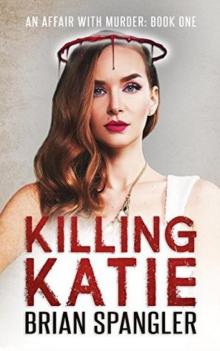 Killing Katie
Killing Katie Painful Truths
Painful Truths Grave Mistakes_A Deadly Vigilante Crime Thriller
Grave Mistakes_A Deadly Vigilante Crime Thriller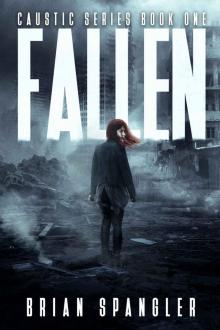 Fallen: Post-Apocalyptic Dystopian Thriller - Book 1 (Caustic)
Fallen: Post-Apocalyptic Dystopian Thriller - Book 1 (Caustic)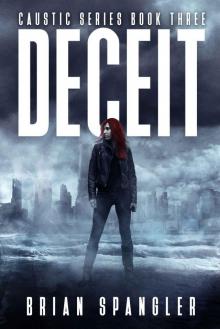 Deceit: Post-Apocalyptic Dystopian Thriller - Book 3 (Caustic)
Deceit: Post-Apocalyptic Dystopian Thriller - Book 3 (Caustic)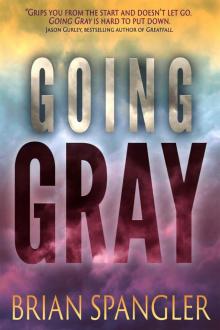 Going Gray
Going Gray Union
Union Grave Mistakes: A Deadly Vigilante Crime Thriller (Affair with Murder Book 3)
Grave Mistakes: A Deadly Vigilante Crime Thriller (Affair with Murder Book 3) End of Gray Skies: An Apocalyptic Thriller
End of Gray Skies: An Apocalyptic Thriller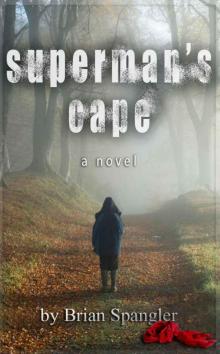 Superman's Cape
Superman's Cape Blinded By Sight (Gray Series Book 3)
Blinded By Sight (Gray Series Book 3)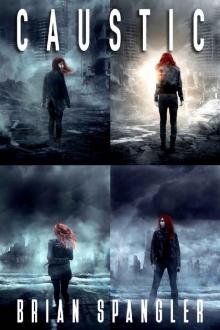 The Complete Four-Book Box Set
The Complete Four-Book Box Set Endure: Post-Apocalyptic Dystopian Thriller - Book 2 (Caustic)
Endure: Post-Apocalyptic Dystopian Thriller - Book 2 (Caustic)